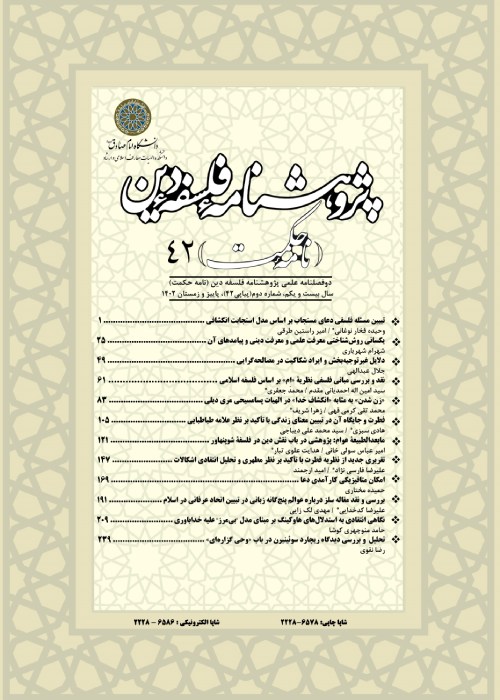Temporality in Modern Thought
Author(s):
Abstract:
The concept of temporality requires that science be divided into two categories: Natural and human. Unlike natural sciences, human sciences are temporal or historical one s,i.e. there is a necessary link between their historical happening and the time of their occurrence. Temporality in modern time has its origin in Descartes philosophy. How ever, it developed through German philosophy from Leibniz’s to Heidegger’s. This perspective follows that every cultural event is confined to its specific time. Temporality is among the features of modern thought. So there is no trace of this phenomenon, in Greek philosophy the principal sources of which are plato’s and Aristotle’s works, since time, according to plato, is just a shadow or an image of eternity and according to Aristole it is one of the accidental categories. In contrast, the concept of temporality involves the principality or essentiality of time. In modern era, Descartes – whose philosophy has Christian leanings- declared that each moment or instant has its own principal reality and enistentially each moment is independent from another. Immanuel kant also declared that time had a direct and efficient role in perception and concept in the fields of sensibility and understanding. In the contemporany age, temporality has a firm link with historicity. This link is one of the features of the monadology of Leibniz, since the monads of Leibniz turn from potential characteristics into actual ones in an unending process throughout the time. Hegel’s philosophy added the concept ‘dialectic necessity’. Hegel declared that historical events could not have occurred at any time and in any mood other than the time and mood in which they already happened. This temporal and historical tradition of German philosophy was handed down to Dilthey. Benefiting from this tradition, he combined the two concepts of historicity and the critique of historical reason. Finally, Heidegger in his book “Being and Time” declared the mood of being as essentially temporal, and temporality as the substance of being.
Language:
Persian
Published:
Philosophy Of Religion Research, Volume:5 Issue: 1, 2008
Page:
5
magiran.com/p532233
دانلود و مطالعه متن این مقاله با یکی از روشهای زیر امکان پذیر است:
اشتراک شخصی
با عضویت و پرداخت آنلاین حق اشتراک یکساله به مبلغ 1,390,000ريال میتوانید 70 عنوان مطلب دانلود کنید!
اشتراک سازمانی
به کتابخانه دانشگاه یا محل کار خود پیشنهاد کنید تا اشتراک سازمانی این پایگاه را برای دسترسی نامحدود همه کاربران به متن مطالب تهیه نمایند!
توجه!
- حق عضویت دریافتی صرف حمایت از نشریات عضو و نگهداری، تکمیل و توسعه مگیران میشود.
- پرداخت حق اشتراک و دانلود مقالات اجازه بازنشر آن در سایر رسانههای چاپی و دیجیتال را به کاربر نمیدهد.
In order to view content subscription is required
Personal subscription
Subscribe magiran.com for 70 € euros via PayPal and download 70 articles during a year.
Organization subscription
Please contact us to subscribe your university or library for unlimited access!


